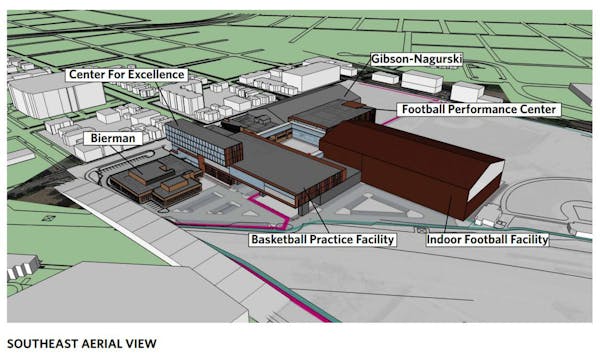The University of Minnesota's chief financial officer said Friday that the school has a "big hill to climb" with fundraising if it's going to begin construction of its proposed $150 million athletics facilities project by October.
The Gophers took more steps up that hill Friday, when they announced a $6 million gift toward the project from retired telecommunications executive Robert Eddy. The gift brings the total raised to $65 million, said Chris Werle, senior associate athletic director.
University CFO Richard Pfutzenreuter said that, as with any project, the school must raise 80 percent of the money — in this case $120 million — before construction can begin. The other 20 percent can be financed and paid off through continued fundraising, he explained.
A university document released Friday states a complete financing plan must be ready for approval at the June 11-12 Board of Regents meeting in order to begin construction in October.
That gives athletic director Norwood Teague four months to raise another $55 million to make that timetable happen, a fundraising pace that would need to be nearly twice as fast as what it has been.
"It's a big hill to climb," Pfutzenreuter said. "Norwood wants to equivocate on putting the pressure on donors to contribute, but that date will have to slide if there's no overall financing plan to move the project forward.
"The Board of Regents won't approve it, and it doesn't get past the president [Eric Kaler] or I without 100 percent of it figured out."
Gophers football coach Jerry Kill repeatedly has said he wants ground broken on a new football facility by summer's end. Big Ten Network analyst Gerry DiNardo and CBS Sports Network's Tom Lemming are among those who have said the 30-year-old practice facilities are among the worst in the Big Ten and hinder Kill in recruiting.
The university originally unveiled plans for a $190 million "Athletes Village" in July 2013 with upgrades for football, men's and women's basketball and several other sports. Last month, the school began soliciting construction bids for a $150 million portion of the project that fast-tracks the football and basketball facilities along with a "Center for Excellence" — a nutrition and academics building to be funded by a $25 million donation from Land O'Lakes. Construction bids are due Monday.
On Friday, the university released its agenda for next week's regents meeting, and the accompanying docket lays out Teague's expected presentation Thursday for the Facilities and Operations Committee.
The regents are expected to approve the use of $15 million, from the money already raised, for construction design.
"When you begin a large fundraising project like this, one thing you need to try to do is keep the momentum going," said regent Clyde Allen, who chairs the Facilities and Operations Committee. "We've had some good early gifts, and I think it's important to show that we can move forward, and we're confident we can get the rest."
Werle said the department spent about a year laying the groundwork for the project and didn't begin officially asking prospective donors for money until July. Using that timetable, Teague has raised $65 million in seven months and needs to nearly double that total over the next four months to start construction in October.
"Our goal is still to get this thing done sooner rather than later," Werle said. "I understand that there are certain timelines in these [university] documents. We're not looking at deadlines. We're looking at a long-term plan. We're trying to get construction started as soon as we can."
The university still intends to fundraise the entire $190 million project, similar to several other major athletics facilities projects underway around the country and Big Ten. But the immediate goal now is $120 million.
"Ideally they would have 100 percent before you put a shovel in the ground," Pfutzenreuter said. "But the minimum is 80 percent — that's a policy. Norwood knows it, and every dean and every faculty member knows it.
"I think this one's going to be certainly a pretty big challenge, but I think if they can get there [to the 80 percent mark], we can figure out the rest."
